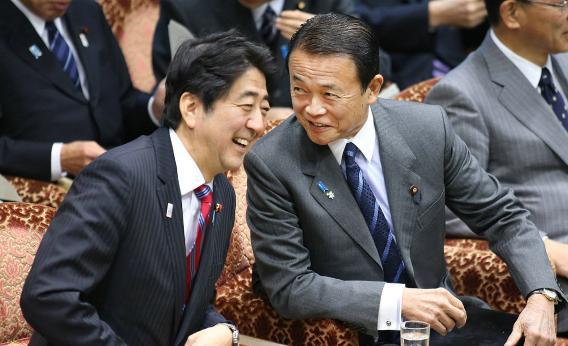The most important public policy debate in the world is happening this week in Japan inside the ranks of that country’s faction-ridden Liberal Democratic Party. On one side is Prime Minister (and former Prime Minister) Shinzo Abe, while on the other side is Finance Minister (and also former Prime Minister) Taro Aso. At issue is who will be the next president of the Bank of Japan. More broadly at issue is whether Japan will shake off the dogmas of independent central banking and once-you-pop-you-can’t-stop opposition to inflationary monetary policy.
If you’ve been reading Moneybox you know about Abe. He’s the man with the plan to save Japan by crushing the Japanese central bank if necessary. America’s Japan-watching establishment doesn’t like him because he’s a foreign policy hawk with retrograde social policy views, and they fear his monetary heterodoxy is just a smokescreen for an overall pernicious agenda. That may be so, but such are the wages of macroeconomic stabilization policy. The Kirchners in Argentina have a lot of bad ideas, but they’ve been able to have an enormous run of political success because at a crucial moment they gave the middle finger to the global financial establishment and adopted heterodox fiscal and monetary policies. Abe’s most important victory so far has been essentially firing the president of the Bank of Japan, badly clipping its “independence,” and seemingly setting the stage to pursue a policy of reflation and increased nominal growth.
But then things hit a snag. Over the weekend Aso made some remarks disparaging the idea of BOJ purchasing foreign bonds, which seemed to cast doubt on his commitment to Abenomics. Then the Japanese government announced a delay in the appointment of a new BOJ chief. The thinking is that Abe and Aso disagree, with Aso aligning himself with the powerful forces of Japan’s entrenched bureacuracy to argue that the job should go to a career civil servant with “respectable” views. Abe prefers a more political choice, with ties to him and a commitment to his agenda.
My insights into Japanese politics are minimal, but my understanding is that they differ from U.S. politics in two relevant ways. One is that the career civil service corps has a lot of clout over economic policy, comparable to how the career military officers’ corps matters in U.S. defense policy. The other is that the parties are highly factionalized and not particularly disciplined. In the United States, there’s no way a determined president would get beaten by a Treasury secretary teaming up with some civil servants, but in Japan a determined prime minister can certainly lose a struggle like this. If Abe wins, he’ll not only do Japan a huge favor; he’ll paint a light out of the macroeconomic tunnel for the rest of the developed world. If he loses, then we’ll all keep muddling through.
